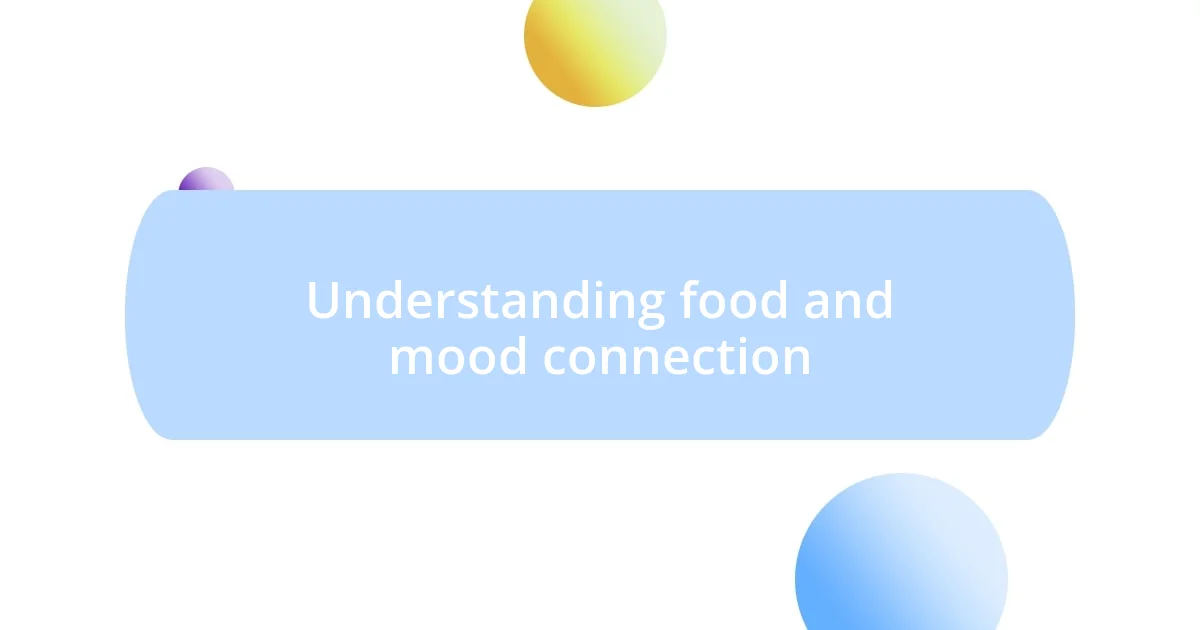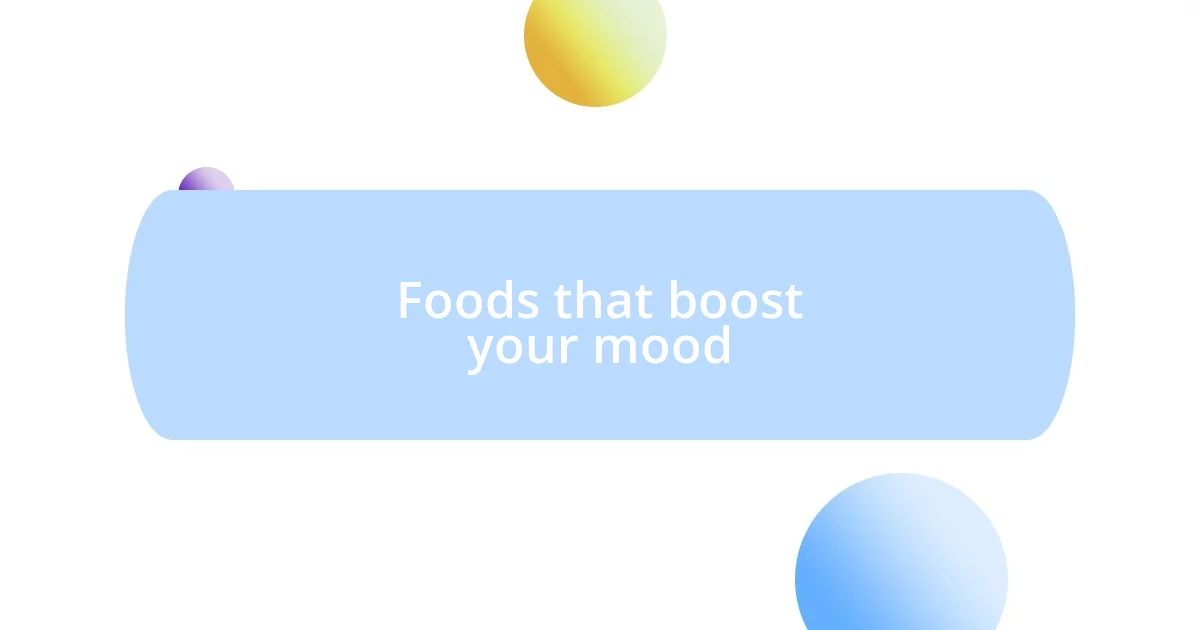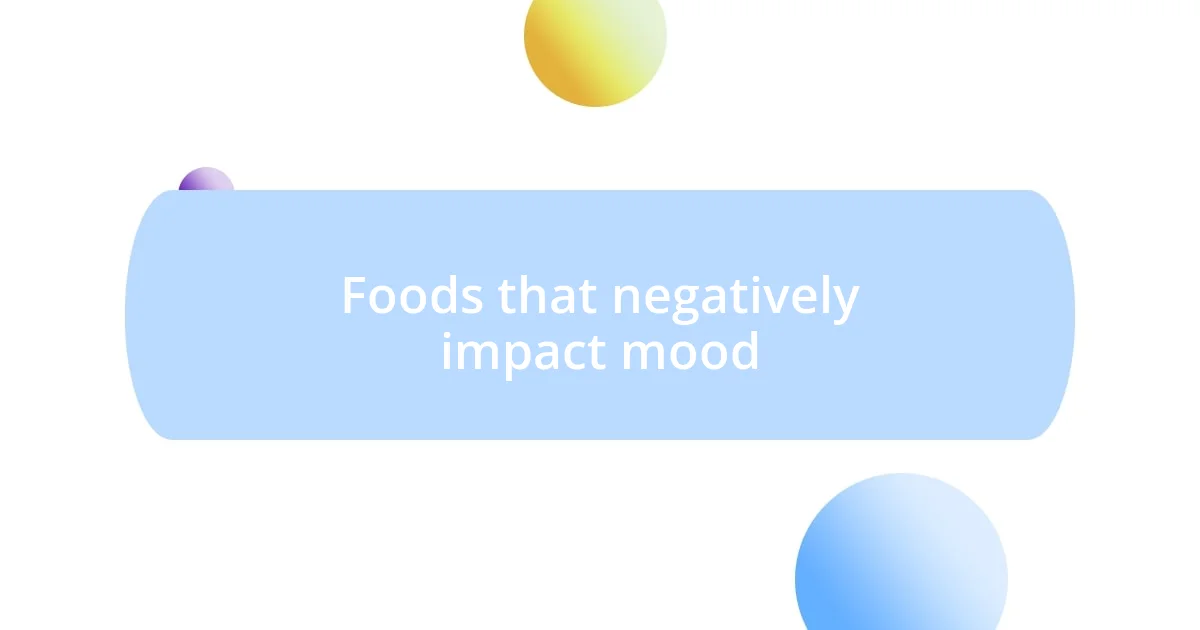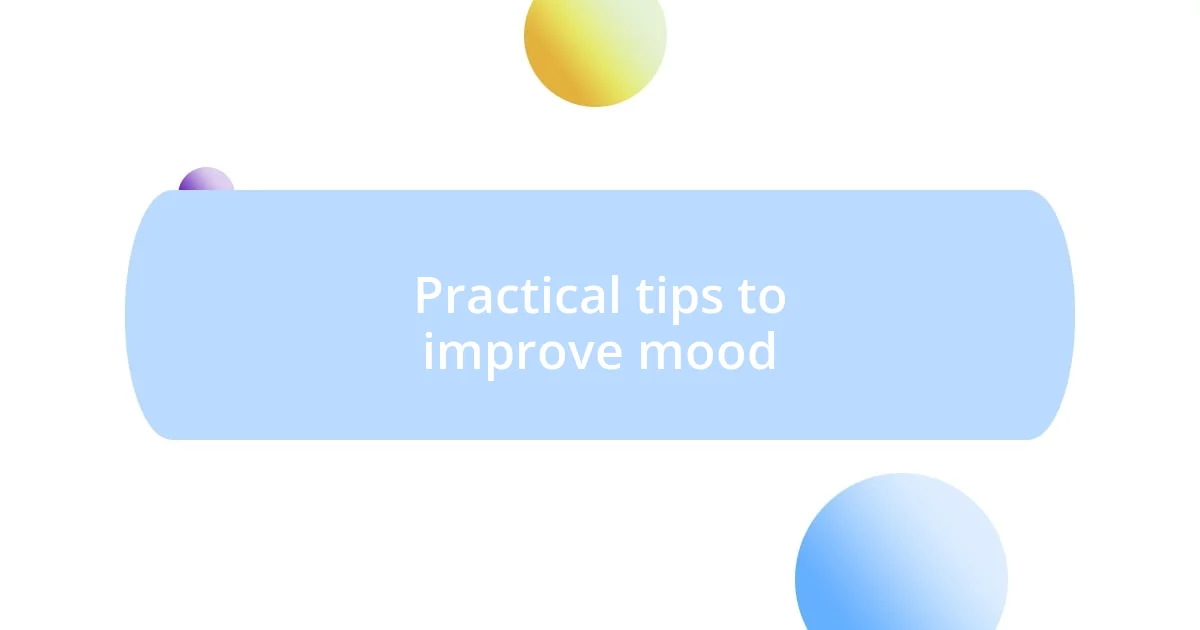Key takeaways:
- The food-mood connection is significant; diet changes, especially incorporating whole foods and omega-3s, can lead to improved mood and emotional health.
- Mood-boosting foods include fatty fish, dark chocolate, nuts, leafy greens, and fermented foods, while processed foods, refined carbohydrates, and excessive caffeine can negatively impact mood.
- Practical tips for mood improvement include staying hydrated, practicing mindful eating, and maintaining regular, balanced meals to promote overall emotional well-being.

Understanding food and mood connection
I’ve always been intrigued by how my mood shifts after certain meals. There was a time when I indulged in sugary snacks when I felt down. The initial burst of joy was deceptive; soon after, I was hit with the dreaded crash, leaving me even more emotionally drained. Have you ever experienced that rollercoaster of ups and downs after eating something sweet?
As I learned more about the food-mood connection, it became clear how complex this relationship is. For instance, I noticed that when I incorporated more whole foods—like leafy greens and wholesome grains—my energy levels not only improved, but my overall mood began to lift as well. How can something as simple as adjusting my diet lead to such profound changes in my emotional state? It’s fascinating to realize that what we consume doesn’t just fuel our bodies; it fuels our minds too.
The neurotransmitter serotonin, often described as a “feel-good” hormone, is largely derived from the foods we eat, which really highlights the importance of nutrition. When I made choices to include more omega-3 fatty acids, found in fish and walnuts, I began to feel a subtle yet significant improvement in my mood. Have you ever thought about how your daily food choices could be impacting your feelings? This connection is far deeper than just hunger; it’s about nurturing our emotional health.

Foods that boost your mood
When I think about the foods that have genuinely brightened my mood, berries always come to mind. I remember grabbing a handful of blueberries during a particularly stressful week and feeling an instant lift in my spirits. Packed with antioxidants, they not only taste incredible but also provide brain benefits. It’s amazing how something so small can make such a difference.
Here’s a quick overview of some other mood-boosting foods that I’ve found to be effective:
- Fatty Fish (like salmon and mackerel): High in omega-3s, they can help ease symptoms of depression and anxiety.
- Dark Chocolate: A delicious treat that, when consumed in moderation, can elevate your mood thanks to its phenylethylamine content.
- Nuts and Seeds: Rich in magnesium and healthy fats, they can support brain health and improve mood.
- Leafy Greens: Foods like spinach and kale are filled with folate, which is crucial for the body’s production of dopamine, the “feel-good” hormone.
- Fermented Foods (such as yogurt or kimchi): They promote gut health, which has a direct impact on our emotional well-being due to the gut-brain connection.

Foods that negatively impact mood
Foods that negatively impact mood can often sneak into our diets without us even realizing their effects. I remember thinking that having just one fast-food burger would be a harmless indulgence, but afterward, I felt sluggish and irritable. It’s shocking how a greasy meal could flip my mood so quickly. I started paying attention to how processed foods, loaded with additives and sugars, pushed my emotional state into a downward spiral.
In my experience, refined carbohydrates were particularly sneaky. I’d munch on white bread or pastries, feeling a momentary high, only to be followed by what I call “the crash of clarity.” It was almost as if my brain was fogged over, making it difficult to focus or feel positive. Realizing that these comfort foods often lack nutrients left me wondering: why do we reach for them when we’re feeling low? The truth is, our bodies crave genuine nourishment, not these fleeting highs.
After experimenting with my diet, I observed another surprising culprit: excessive caffeine. I used to think a strong cup of coffee was my miracle worker for mood and energy, but too much left me jittery and anxious. The emotional rollercoaster that followed was exhausting. I learned the hard way that moderation is key—too much of something can truly derail our mental well-being.
| Food Category | Impact on Mood |
|---|---|
| Processed Foods | Can lead to irritability and sluggishness due to lack of nutrients. |
| Refined Carbohydrates | May cause sudden mood swings followed by a crash in energy levels. |
| Excessive Caffeine | Can increase anxiety and lead to emotional instability. |

Practical tips to improve mood
One practical tip I can share is to stay hydrated. I learned the hard way that dehydration sneaks up on you, often leaving you feeling irritable and fatigued without even realizing it. Drinking water regularly, maybe even infused with lemon or mint for some zest, truly shifts my mood. Have you ever noticed how much better you feel after a glass of water when you’re feeling down?
Another approach I’ve found effective is the simple act of mindful eating. I remember sitting down with a colorful, balanced meal, consciously savoring each bite. It’s surprising how being present in that moment can elevate your mood. Have you tried putting away distractions during meals? It creates a sense of gratitude and truly makes each ingredient shine, enhancing both your emotional and physical well-being.
Lastly, incorporating regular meals and snacks into my routine has been a game-changer. I once skipped breakfast, only to find myself grumpy by mid-morning. Now, I prioritize having a healthy breakfast that includes protein and fiber. Not only does it keep my energy steady, but it also sets a positive tone for the day. Don’t you agree that starting your day off well can cascade into better moods later on?

Personal experiences and insights
I can recall a time when I decided to treat myself to a cupcake after a long week—it felt like a reward, but it quickly turned sour. That initial sweetness dissolved into a wave of guilt and fatigue, leaving me questioning my choices. Have you ever tasted something that felt indulgent at the moment but left you regretting it soon after? It made me realize how interconnected our food choices are with our emotional state.
There’s also that nagging feeling I get when I skip my morning smoothie packed with greens and fruits. On those days, I can’t help but notice my mood dips in tandem with my energy levels. It’s almost like the nutrients fuel not just my body but also my mind. Reflecting on this, I wonder how many of us overlook the mental benefits of eating well.
I find it fascinating how experimenting with a new recipe can completely change my day. The joy of creating something healthy, like a vibrant quinoa bowl, lifts my spirits instantly. It’s not just about the food; it’s the process itself that feels rewarding. Isn’t it incredible how engaging in cooking can nourish not only the body but also the soul? This connection reinforces my belief that what we eat is deeply tied to how we feel.














